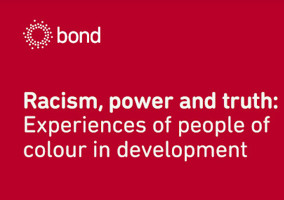Mind expects to “lose people; staff, supporters, and donors” as it implements a policy to be actively anti-racist, its chief executive said yesterday.
Paul Farmer, chief executive of Mind, was speaking at the All Party Parliamentary Group (APPG) for Charities and Volunteering, convened by NCVO, to discuss racism in the sector.
He said that last month Mind had launched a new strategy with a clear “ambition to become a truly anti-racist organisation” and “an unflinching advocate for racial justice and mental health”.
Farmer added that this is “absolutely rooted in our cause of mental health and the relationship between racial inequality and mental health. People from racialised communities are more likely to experience a mental health problem, less likely to receive support, and have poor outcomes and services”.
Since the charity began this work, he said there has been an element of its own staff and supporter base who disagree with the position.
“We know that we will probably lose people; staff, supporters, and donors, who don't necessarily agree with our stance on anti-racism,” he said.
When Mind tweeted about Meghan Markle and Piers Morgan a few months ago, 20% of the responses were racist.
Farmer added: “We have to accept that that's part of what we're going to be about as an organisation. And we also know that some people will walk away from us and that's fine as far as we're concerned.”
‘What we had been doing was not good enough’
Farmer told the virtual audience that Mind began this programme of work around anti-racism last year when it realised it had not done enough in the past.
“We realised in the context of the murder of George Floyd, and the work that had been done by CharitySoWhite and the Home Truths report [by Voice4Change England and ACEVO] that we were nowhere near [where we needed to be].”
He added that while Mind has campaigned on inequality and race issues, “it was abundantly clear that what we had done historically wasn't nearly good enough”.
Not putting well-meaning thoughts into action
Mind brought in Frances Brown as the strategic lead for its race equality initiative. She conducted a series of workshops and a data mapping exercise to understand where the charity was at.
Brown told the APPG: “We learned that the norms of whiteness are quite prevalent in the organisation – that's not a surprise as that's concurrent with what was happening in the sector.
“But, we also realised that there was a bit of a dichotomy between what we call perceived rhetoric and current practice.”
She explained that this meant that Mind was “well-meaning, respectful” but that this was “not necessarily playing out into practice in terms of reaching and addressing audiences”.
‘In the foothills of our journey’
Farmer emphasised that Mind was at the beginning of this process and called on the sector as a whole to be open to learning.
“We're very much in the foothills,” he said, “of what's going to be a very long journey.”
He said his early learnings are that it is “really important to support your staff to be able to give them the voice, to be able to feel confident that they have the voice”.
Secondly, he said: “This is clearly a leadership issue. We really recognised as a group of predominantly white leaders that we bring our own white privilege with us to this issue and it's something we have to work on.”
He said Mind had already taken steps to diversify its board.
Farmer described Mind’s anti-racism strategy as an “organic document” which will “change and evolve as we try to test and try out different approaches”.
He is also hoping to work with other charities to learn what is working, “to share some of the power that we have” and to “monitor progress”.
In future years he hopes: “We'll be able to give you a good quality update on the progress that we've been able to make, and I think for us as a sector, this is about us being open and honest about both successes and failures, so that we can all learn from each other.”
Related articles












